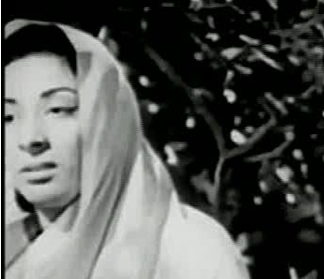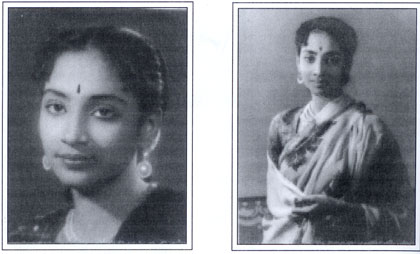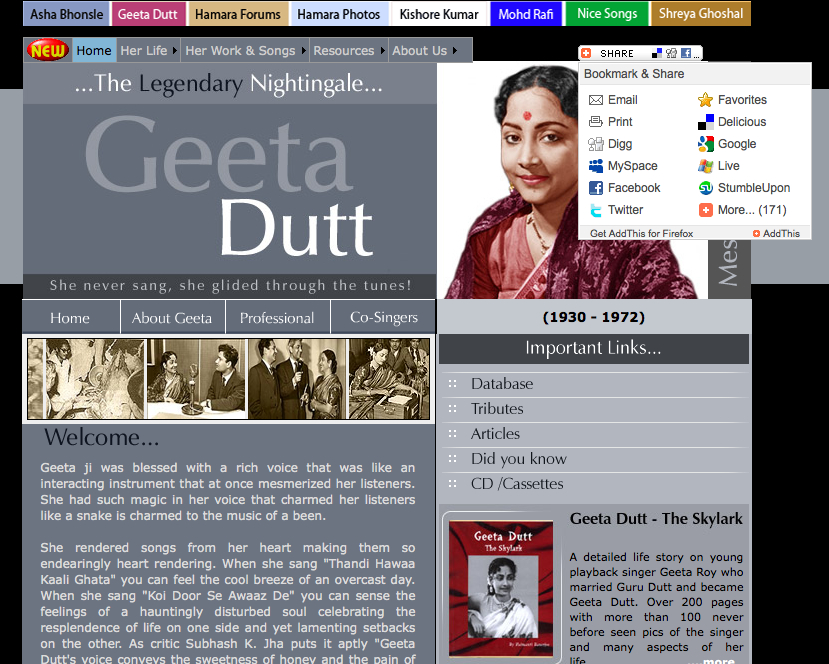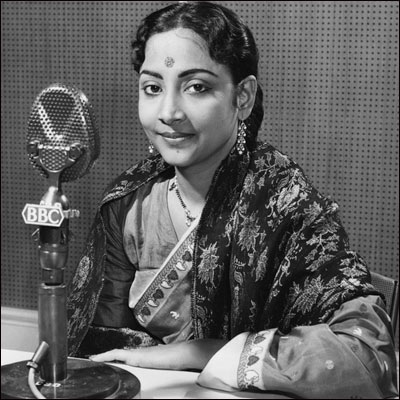Geeta Dutt was blessed with a rich voice that was like an interacting instrument that at once mesmerized her listeners. She had such magic in her voice that charmed her listeners like a snake is charmed to the music of a been. She rendered songs from her heart making them so endearingly heart rendering. When she sang “Thandi Hawaa Kaali Ghata” you can feel the cool breeze of an overcast day. When she sang “Koi Door Se Awaaz De” you can sense the feelings of a hauntingly disturbed soul celebrating the resplendence of life on one side and yet lamenting setbacks on the other. As critic Subhash K. Jha puts it aptly “Geeta Dutt’s voice conveys the sweetness of honey and the pain of the bee sting.”
Geeta Dutt was born into a rich zamindaar’s family as Geeta Ghosh Roy Chowdhuri in Faridpur, East Bengal in the year 1930 on 23rd November. When Geeta was 12 years old, the family decided to move from their home in Faridpur District in East Bengal to Bombay (now Mumbai). Even though she was growing up in rich surroundings, when moved to Bombay, her family had to start all over again. They took up a modest apartment in Dadar area.
In the ensuring months one day when she was singing a song in her flat, music director Pandit Hanuman Prasad heard her voice. He persuaded her parents to have her try to sing in movies. He took Geeta under his wings and trained her in singing and later launched her into singing in the films. In the year 1946, she got the first break when she got an opportunity to sing in the film “Bhakta Prahlad” for which Hanuman Prasad was the music director. She was given only two lines to sing in the movie in a few songs for this film.She was barely sixteen year old at this time. But those two lines caught the attention of everyone in the recording studio.
Here is an extremely rare audio of one of the four songs Geeta sang for the film Bhakta Prahlad (1946). The song is heavily chorus based but she gets to sing some lines on her own, which can be clearly heard. Her voice is so fresh, sweet and uninhibited, though not yet fully trained.
That singing of two lines in “Bhakt Prahlad” did a lot of good for Geeta. She kept herself busy singing in several movies that year (1946). Here is another rare song, her first duet with legendary Mohammad Rafi for the film Manasarovar (1946). The composer is Satya Narayan (S N) Tripathi and the lyrics by Sarawati kumar “Deepak”. This is a captivating and inspiring song filled with praise for the country.
But her biggest breakthrough was yet to come and fortunately for Geeta and music lovers it didn’t take long. Composer S.D. Burman heard Geeta’s voice and immediately decided to have her sing in “Do Bhai”. Geeta had this unconventional way of singing. The time was when most singing styles had origins of ghazals. Geeta who had this innate talent, with no formal training in singing of the type of songs that were in vogue at that time, introduced her own brand of appealingly fresh and free flowing style of singing. Her singing was based on instincts and spontaneity, guts and feelings, and love and pensiveness that resulted in breathing life and emotion into each song she sang. She got her big break with “Do Bhai”. The producers of the film were not willing to give the main heroine (Kamini Kaushal) songs to a relatively newcomer and insisted on using some established singers. S D Burman was persistent and ensured the producers about his young prodigy. When the song “Mera Sundar Sapna Beet Gaya” was recorded, every one in the recording room was mesmerized. They knew that a bright star was born!
The music of the film Do Bhai (1947) in which she sang as many as six songs was a major hit. In particular, her song “Mera Sundar Sapna Beet Gaya” became an overnight sensation. Her voice was so fresh, unique and ethereal it appeared to have breathed life into those songs. With the stardom achieved from the success of “Do Bhai”, Geeta Roy became extremely busy. Almost as if by magic, an obscure singer not known to many people across the country became a celebrity and a household word overnight. Her success story continued in the year 1948.
Here is a charming duet sung by her with veteran singer Rajkumari Dubey for the film Suhaag Raat (1948). The film was produced and directed by legendary Kidar Sharma and the music was composed by B Vasudev (Snehal Bhatkar)
With two great years in succession, Geeta became the undisputed number one female playback singer in the nation in 1949. She was virtually unchallenged at this juncture in her career. The hitherto established singers like Rajkumari and Shamshad Begum were relegated to lower spots. She sang close to fifty songs in the year 1947 and then went on to sing a hundred songs each in the years 1948 and 1949. In these three years, she sang for every prominent music composer on the music scene. She was already singing film and non-film songs in her mother tongue Bangla as well.
Here is a video of the song “Naache ghoda, naache ghoda” from the magnum opus film Chandralekha (1948). All the other songs of this film were sung by Uma Devi (Tuntun) ji. The producer S S Vasan added this song at the last minute in the film. Great song by lyricist Bharat Vyas and lovely singing by young Geeta Roy who was just 18 year old. MD is S. Rajeshwar Rao who gave music to the original Tamil and the Hindi version as well.
Nargis’s mother produced the film “Darogaji” (1949) starring her daughter and veteran actor Jairaj. Composer Bulo C Rani made a sort of record for composing all the 12 songs of this film in the voice of young Geeta Roy. Here is a lovely song from the same film:
She again sang as many as 12 songs for Ranjit Movietone’s “Jogan” (1950) starring Nargis and Dilip Kumar for composer Bulo C Rani. It was said that if Meerabai would have taken a new life, she would have sung in the voice of Geeta. Her bhajans are the most famous ones from this film. Here is a light hearted song from the same film.
By this time, she also began singing for Gujrati films and became the topmost female playback singer. A girl who did not know any language other than her mother tongue Bangla, this was a great achievement. The year 1950 found Geeta Roy in a tough spot. The undisputed reigning singing sensation and queen she was for the past three years (1947 to 1949), she suddenly found herself relegated to the second position. It was the onslaught of Lata Mangeshkar wave that took the country by storm. Still Geeta continued to sing in Hindi and Gujrati films and sang close to a hundred songs again in this year.
Here is a rhythmic “Train” song from the film Dilruba (1950) starring Dev Anand and Rehana. Great composition of veteran composer Gyan Dutt!
She sang for several films which were Hindi remakes of hit films from the south India. Notable films are Mangala (1950), Sansar (1951), Mr Sampat (1952), Patal Bhairavi (1952), Ladki (1953) etc. Here is an excellent, mischievous and yet romantic song from the film Sansar (1951). Its her duet with Gulam Mustafa (G M) Durrani, a singing sensation of the late 30s and 40s.
One can say that Geeta Dutt’s singing life was largely influenced by her personal life. The year 1951 was a very eventful year in Geeta’s life. While singing for the film “Baazi” (1951) she met the first time director Guru Dutt. When S.D. Burman had her sing songs of “Baazi”, sort of a complete metamorphism happened. S D Burman explored the sensuality in her voice to the hilt and composed a Ghazal in western style which took the nation by a storm. With the thundering success of the songs (Tadbeer se bigadi hui taqdeer bana le, Suno gazar kya gaaye etc) and its music, the movie “Baazi” changed Geeta’s life forever. Geeta Roy found herself extremely busy in 1952. She had assignment after assignment that kept her singing career in a high gear. She delivered hit after hit that year. Amidst all this, she found time to continue her romantic relationship with upcoming director Guru Dutt.
Here is a dance based song “Dekh ke akeli mohe” from the film Baazi (1951). Music by S D Burman and lyrics by Sahir Ludhiyanvi. Incidently, the tune of the song is inspired by a superhit “Garba” song “Taaliyon naa taale” sung by Geeta herself for composer and lyricist Avinash Vyas in the year 1949.
Clearly early fifties were her best years as a playback singer supreme. During these years, she still maintained the status as an influential vocalist of Hindi film world because she kept singing song after song delighting millions of moviegoers throughout India. The young and famous Geeta Roy and the struggling director Guru Dutt tied knots on May 26, 1953.
Here is a charming composition of O P Nayyar from his debut film Aasmaan (1952). She is singing “Dekho jaadu bhare more nain” so effortlessly.
Not many know the fact that Geeta Roy sang dozens of songs for popular actresses like Nargis, Meena Kumari, Madhubala, Nutan, Vyajayantimala, Nutan, Nalini Jaywant, Durga Khote etc. Here is a charming number sung by her filmed on Meena Kumari for the film Parineeta (1953). This song was included in the film when it was released in the theaters, but was deleted from the film for unknown reasons. This is what our friend and a great music lover “Vipin ji” has to say about this song, rather a divine experience:
There were in reality two enchantresses in this movie: Geeta Dutt and Meena Kumari. The sweetness of Geeta’s song and the beauty and realism of Meena’s acting struck me as tailor-made for each other. One let honey flow through her voice, the other through her facial expressions.
Because of the wedding and the new responsibilities of a new household Geeta found herself with not much time to sing in as many songs this year as before. In 1954, Geeta sang even fewer songs than the year before. Her double duties as a wife and as a singer were demanding. Amidst all of this she found herself expecting her first child.
Here is a sweet number from the film Naukari (1954) composed by Salil Chowdhary and penned by Shailendra.
Some of the most beautiful romantic songs Geeta sang were during these days and they were spilled and richly splashed with her youthfully exuberant voice. On one side she sings “Babu Ji Dheere Chalna” and the next moment she scolds her lover by singing “Jaa Jaa Bewafaa”. Next she entices her lover with the song “Hoon Abhi Main Jawaan”. When he is crossed with her she begs by singing “Yeh Lo Main Haari Piya”. This whole gamut of romantic spectrum emotional rainbow was never repeated with such vibrant verve of vocals and velvety velocity of spells of splendor by anyone else before or after Geeta.
A chhed-chhad duet with Kishore Kumar from the film Adhikar (1954) is here:
Being wed for two years and raising a son who already was a year old, Geetaji found little more time in the year 1955 to participate in singing. Her husband Guru Dutt made “Mr. & Mrs. ‘55” during 1955. It had Madhubala and Guru Dutt in the leads and was directed by Guru Dutt himself. Its music once again was composed by O.P. Nayyar. By this time, the Geeta-OP tandem were in sync as the pair delivered hit after hit. “Mr. & Mrs. ‘55” was no different. This had nine songs and Geeta sang six of them.
Here is a charming number sung by Geeta Dutt filmed on bubbly Geeta Bali. The song is composed by Anil Biswas and the lyrics are by veteran Prem Dhawan. It is from the film Faraar (1955).
Year 1956 was another eventful year in Geeta’s life. She gave birth to her second son, Arun, on July 10. With her first son growing up, with the arrival of newly born, and her husband Guru Dutt busy with the production of “C.I.D.” and laying groundwork for his groundbreaking “Pyaasa”, she still managed to find time to sing.
In “Toofan Aur Diya” released in the year 1956, she sang three songs for Vasant Desai (two solos and a duet). One of the outstanding song from this was the solo Geetaji sang “Meri Aan Bhagwan”and the fruit-vegetable vendor song “Aaya re bhajiwala”.
Geeta was back singing for Burmanda in two movies in 1957. These were “Nau Do Gyarah” (two solos and a duet) and “Pyaasa” (three solos and a duet). Guru Dutt’s “Pyaasa” was a landmark in Indian movie history. It was voted as one of the top 100 movies in the world by the Time magazine.
Here is a lovely song from the film Bhakta Dhruv (1957). It is composed by Avinash Vyas for whom she sang close to a hundred songs in Hindi and Gujrati.
In spite of many personal problems she was having, Geeta, a phenomenon she was, still found time to keep her singing career intact as late as 1958 and 1959. Here is an epitome of “Bhaav Gayaki” at its best. The song is composed by a relatively unknown composer Shailesh Mukherji for the film Savera (1958).
Another classic example of this sweet romantic song with composer Hemant Kumar. The film is Police (1958) and the song is filmed on Pradeep Kumar and Madhubala.
Singing was her love. She wasn’t going to give it up without a fight. In her husband’s “Kaagaz Ke Phool” Geeta sang the song of her life. “Waqt Ne Kiya Kya Haseen Sitam”.
Happiness of a blessed married life lasted only briefly for Geeta Dutt. She had differences with her husband and went through very troubled times. Her marital problems were taking a heavy toll on Geeta by the early sixties. It appeared on the surface that this may slow down her singing assignments, but she still managed to sing in the movies.
Chitragupt continued to compose melodious songs for her. Here is another foot-tapping number song, a duet with Mohammad Rafi for the film Baraat (1960).
In 1961, in spite of all the problems they were having Geeta and her husband, Guru Dutt, were still living together. There was still something left between the two. These brief moments of harmony were giving her enough strength to continue with her passion, singing.
Here is a song filmed on Helen from the film Passport (1961) composed by Kalyanji-Anandji.
Year 1962 was another eventful year in Geeta’s life. The proof that there was love still existed between Geeta and Guru Dutt, their third child, a daughter named Nina, was born in August. This however did not solve their problems. The impending gloom and doom was fast nearing.
Here is a lovely song sung by her for maestro Naushad for the film Son of India (1962).
The decadence was now completely set in by 1963. Geetaji’s fortunes are on the fast decline. She was withdrawing herself from everything. She got separated from her husband.
Still the charm in her voice was alive. Listen to her singing for Mala Sinha for the film Aankh Michauli (1963) here. The music composer is Chitragupt for whom she sang the most of her songs (over a hundred).
The year 1964 was a devastatingly eventful year in Geeta’s life. On October 10, Guru Dutt died of an overdose of sleeping pills. He was only 37. By early 1965 Geeta recovered from the mental breakdown she suffered after her husband’s unexpected death. Shattered and devastated, she was slowly trying put her life together again.
She continued to struggle and support herself through stage shows etc and also acted in a Bengali film in the year 1967. Here is a rare pic of her from the film Badhu Baran (1967) in which she acted.
In 1970 Geeta sang in only one movie, a solo in Ratandeep Hemraj’s “Insaan Aur Insaan”. Geeta sang in three movies in 1971. These were Kanu Roy’s “Anubhav” (three solos), a duet in Salil Chowdhury’s “Raat Ki Uljhan”, and a triplet in Shankar & Jaikishan’s “Jwala”.
A note about the songs of “Anubhav”. Geetaji sang these so beautifully with plenty of melody that surprised even her worst critics. She once again proved to the music world that she still has it in her. Everybody thought she will now bounce back because they represented some of her finest work. But life takes many unexpected and tyrannical turns. It is so hard to believe that these songs would also be almost her swan songs. Talking about melody, take for example, the song “Koi Chhup Ke Se Aake” from “Anubhav”. Here is one music lover wrote about this song (the quote is not exact but is reworded). “… The soft, romantic type of songs like these flowered in Geetaji’s melodious and expressive voice… Geetaji’s singing in “Anubhav” demonstrates how much she still had to offer even at the fag end of her life. In this song, she is soft, teasing, whimsical, romantic all at once and the ever so slight tinge of pathos in her voice highlights the enigma that was Geeta Dutt…”.
1972 was an eventful year in Geeta’s life and in the history of Hindi film world. She sang in only one movie that year, Subir Sen’s “Midnight”. These were a solo and a duet. But on July 20, 1972, she passed away as a result of continuing and declining bad health. She was just 41 year old.
The voice that thrilled and filled with joy for millions of music lovers was gone forever. Here she was whose voice stopped aging as proven from the songs of “Anubhav”, sang only the previous year, finally succumbed to ill health. The voice that had the youthful joie de vivre was completely quelled. The ease and spontaneity that were the hallmarks of Geeta’s singing could never sing another song. The voice that defied convention with its enthralling tonal quality, that was sumptuous in expression, that was enticing with melody, that was sweet like honey, that had soothing mellifluous quality, that was enchantingly dulcet, and that explored a gamut of emotions from subtle enticement to wistful longing was extinguished forever.
The frenetic cadence of modern life that Geeta ji captured through her ceaseless spontaneity ceased to exist in 1972. But Geeta ji in a short and glorious span of only few years left us with a rich legacy of thousands of songs into which she breathed life with her unique ethereal voice that have stood the test of time and continue to enthrall generations after generations of fine music lovers all over the world.
Please do visit our non-commercial and ad-free website http://www.geetadutt.com dedicated to Geeta Dutt. You can listen to Hindi Film songs, Hindi non-film songs, Gujrati songs and Bengali songs on our website. You can also watch videos of her songs and see many rare photos of this great singer. We also strongly recommend you to read the book “Geeta Dutt : The Skylark” which throws a light on many unknown facets of Geeta as a singer and as a person. Here is a pic of the twice winner of national award for documentary making, Haimanti Banerjee, the author of the book.
Note:
We are thankful to our friend Swarapriya who put together all of the above information on our website. Also heartfelt thanks to our friends Dr Mahesh and Jyoti Prakash Guha ji for many rare facts and rare pictures. Million thanks to our friend Anupama who has developed this Youtube channel dedicated to Geeta Dutt’s music. You can experience over 400 songs of Geeta Dutt in this channel.
Finally a big bunch of thanks to our friends Subir and Gajendra for designing, developing and maintaining this wonderful site, a tribute to a legend.
Note:
This post first appeared here. Thanks to the site owner Rohit for hosting this special article on his site.










